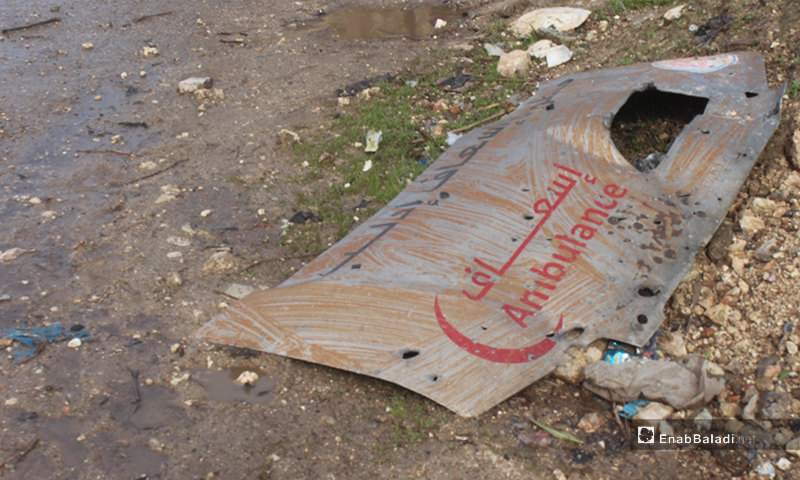On the paved road in the village of Arab Said of western Idlib countryside, away from contact lines and battles, Dima and her colleagues have moved around searching for informal settlements for displaced people. The humanitarian worker did not know that her mission of monitoring and mobilizing communities will be her last on that day. Dima was injured after being close to a vehicle targeted by “inaccurate” shells from the International Coalition Forces (ICF).
“A first by the International Coalition Forces”
Dima Abdan spent 14 days in the hospital, having received abdominal injuries from an International Coalition’s strike splinters on a vehicle that carried members of the Guardians of Religion Organization (GRO), according to the ICF.
On 15 October, Dima collected data of displaced persons who were to be transferred by Bonyan Organization to a camp equipped with infrastructure in Salqin town in northern Idlib countryside.
The young woman died on 29 October, and she was not the first staff member of Bonyan Organization to be killed, according to what the organizations’ partnership manager, Mohammed al-Bakkar, said to Enab Baladi.
Al-Bakkar talked about the Ain Jalout massacre in which 25 students and teachers were killed, in April 2014, after the Syrian regime targeted a school administrated by the organization in Aleppo.
The incident that led to Dima’s death is the first time a humanitarian worker of the Bonyan Organization dies due to the International Coalition’s bombing.
Meanwhile, the ICF refers to civilian casualties by “accidentally killed people,” and pledges more caution in its operations in Syria, which have killed thousands of civilians in the last six years since the International Coalition’s formation to fight the so-called Islamic State (IS) organization.
Al-Bakkar said that those operating in the humanitarian sector are aware of their work risks, but they have chosen to continue with their missions despite being “directly targeted.”
He also pointed out that targeting the infrastructure from schools and hospitals is the first thing the regime forces and their allies do when starting military campaigns in the region, with all the conflict parties knowing that these facilities are filled with human cadres.
According to al-Bakkar, “the social obligation” is the motive behind continuing this humanitarian job.
He added, “the region’s dire economic and humanitarian situation forces humanitarian workers to continue despite being targeted.”
Al-Bakkar said in a voice message that the targeting aimed to cause panic and deprive people of safety by destroying infrastructures that alleviate their suffering.
Equal “to those who carried weapons against the regime”
Few days separated Dima’s killing from the death of two other humanitarian workers from Ihsan for Relief and Development Organization while working in Ariha town in the southern Idlib countryside on 4 November.
The driver Ghadir Jisri and Ibrahim al-Younes, a protection worker in the psychological support department of the Ihsan organization, fell victims to violations of the “cease-fire” agreement on residential areas in the southern countryside of Idlib by the regime forces and Russia.
The bombing and military escalation postponed and hindered humanitarian and relief work, despite people’s continuing need, the media coordinator in Ihsan organization, Maher Hajj Ahmed, said to Enab Baladi.
Hajj Ahmed indicated that humanitarian workers were forced to work in areas of tension to help those in need.
The “constant fear” of targeting did not stop the humanitarian action, with humanitarian workers realizing that according to the regime and Russia, “they are equal to those who held arms against them,” according to Hajj Ahmed.
He added, “most of the displaced people in need are our people, and most of our employees are also displaced from their villages, so they feel what the displaced people have experienced.”
Mohammed Hallaj, the director of the Syrian Response Coordination Group (SRCG), said to Enab Baladi that preventing humanitarian workers from providing their services is the actual goal of the targeting.
Hallaj added that six relief workers were killed by various targeting since the “cease-fire” agreement came into effect last March. While 41 humanitarian workers were killed since the 2018 “Sochi” agreement.
Humanitarian Affairs and Emergency Relief Coordinator Mark Lowcoc described in his speech before the Security Council on 27 October that humanitarian working personnel’s targeting was “unacceptable and should never be normalized.”
While the Regional Humanitarian Coordinator (RHC) for the Syria Crisis, Kevin Kennedy, condemned in a statement, published on 18 October, the targeting of aid workers, which hundreds of whom have been killed and injured in Syria since 2011.
This report was prepared with the contribution of Enab Baladi’s correspondent in Idlib Yousef Ghuraibi

